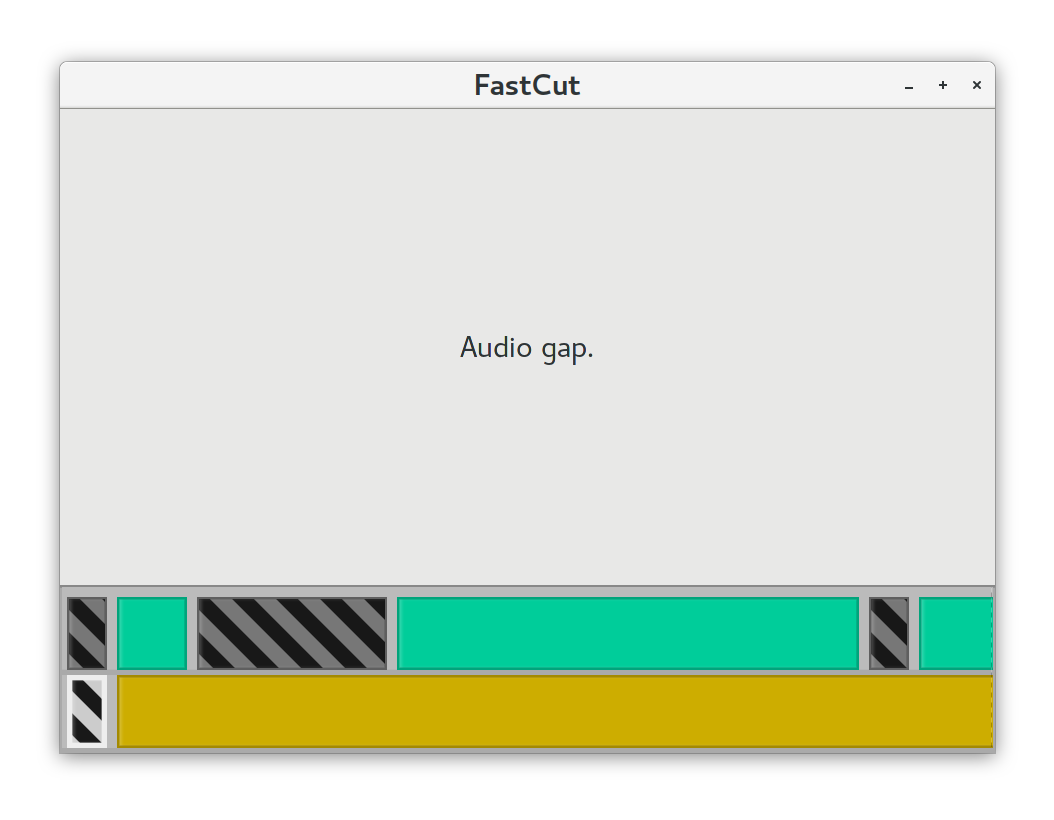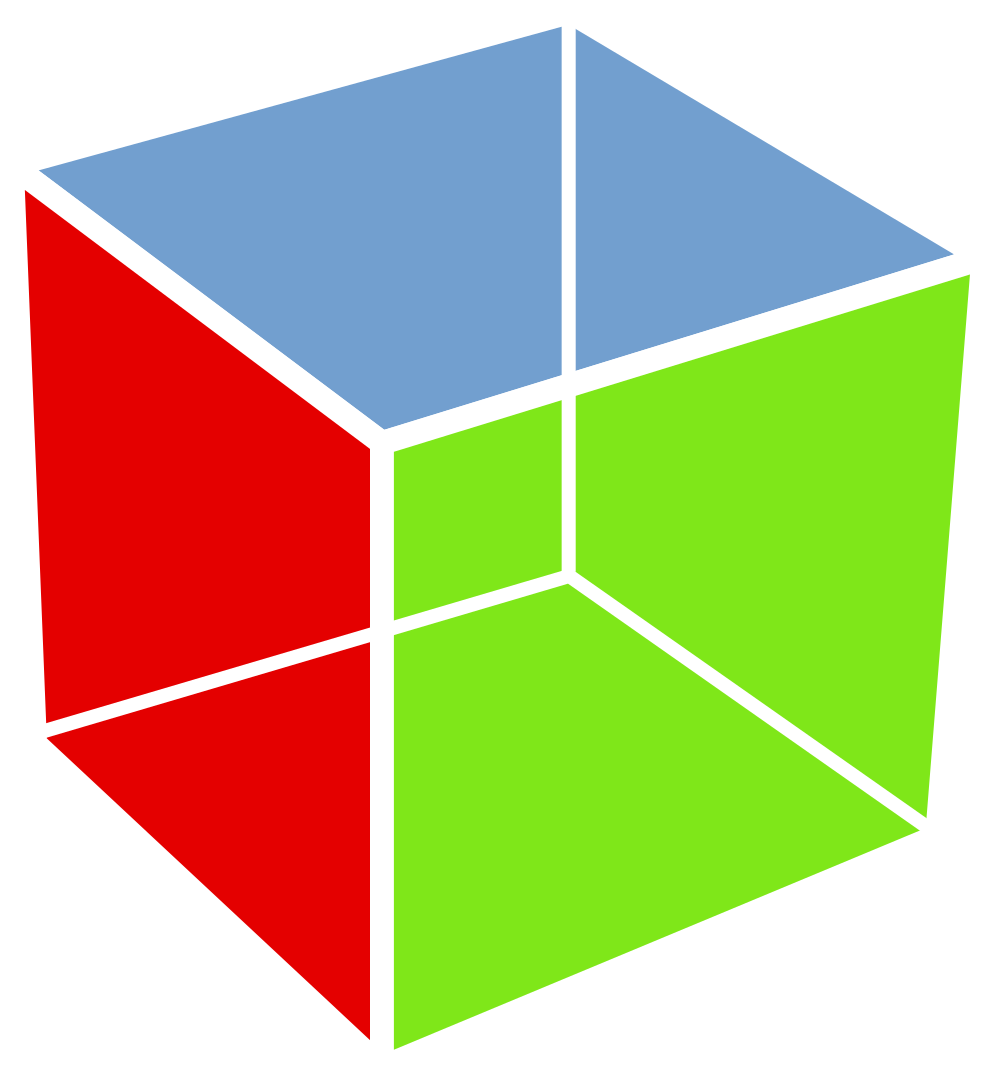Declarative GTK+ Programming with Haskell
Oskar Wickström
September 2018
My Project: FastCut
|

|
Desktop GUI Frameworks and Haskell
- Imperative
- GTK+
- Qt
- wxWidgets
- FLTK
- Declarative
- Reflex
- Threepenny-gui
- (Custom WebKit with PureScript or Elm)
GTK+
|

|
Haskell and GTK+
Haskell GTK+ Bindings
- gtk2hs
- Deprecated in favour of haskell-gi
- haskell-gi
- Mostly generated using GObject introspection
OverloadedLabelsfor methods, attributes, and signals- Includes many packages
- gi-gtk is the library I’ll focus on today
“Hello, world!” with gi-gtk
main :: IO ()
main = do
_ <- Gtk.init Nothing
win <- new Gtk.Window [#title := "Hi there"]
#resize win 200 150
_ <- on win #destroy Gtk.mainQuit
button <- new Gtk.Button [#label := "Click me"]
_ <- on button
#clicked
(set button [#sensitive := False, #label := "Thanks for clicking me"])
#add win button
#showAll win
Gtk.main
“Hello, world!”
Slightly Larger Example
An Editable List of Names
editableNamesList :: IORef [Text] -> IO Gtk.Widget
Modifying State in a Callback
editableNamesList namesRef = do
list <- new Gtk.ListBox []
initialNames <- readIORef namesRef
forM_ (zip initialNames [0 ..]) $ \(name, i) -> do
textEntry <- new Gtk.Entry [#text := name]
void . on textEntry #changed $ do
newName <- get textEntry #text
atomicModifyIORef' namesRef $ \oldNames ->
let newNames = oldNames & ix i .~ newName
in (newNames, ())
#add list textEntry
Gtk.toWidget list
Using the Editable List
main = do
... namesRef <- newIORef ["Alice", "Bob", "Carol"]
list <- editableNamesList namesRef
#add win list
An Editable List of Names with Updates
editableNamesList :: [Text] -> IO (Gtk.Widget, Chan [Text])
Sending State Updates on a Channel
editableNamesList initialNames = do
updates <- newChan
namesRef <- newIORef initialNames
list <- new Gtk.ListBox []
forM_ (zip initialNames [0 ..]) $ \(name, i) -> do
textEntry <- new Gtk.Entry [#text := name]
void . on textEntry #changed $ do
newName <- get textEntry #text
writeChan updates =<<
(atomicModifyIORef' namesRef $ \oldNames ->
let newNames = oldNames & ix i .~ newName
in (newNames, newNames))
#add list textEntry
widget <- Gtk.toWidget list
return (widget, updates)Printing Updates
main = do
... (list, updates) <- editableNamesList ["Alice", "Bob", "Carol"]
void . forkIO . forever $ do
names <- readChan updates
print names
#add win list
Callback Problems
- When the application grows, callbacks gets unwieldy
IORefs, scattered state and logic- Side effects
- Impractical to test
- Two phases: first construction, subsequent updates
- GUI code should be:
- A separate concern
- Declarative
- Concise
- Core application logic should be:
- Pure (ideally!)
- Decoupled from GUI code
Going Declarative
Declarative GTK+
- Declarative markup, pure functions from state to markup
- Declarative event handling, not concurrency primitives
- “Virtual DOM” patching
- Not tied to any particular architecture
gi-gtk-declarative
- github.com/owickstrom/gi-gtk-declarative
- Very thin layer on top of
gi-gtk- Uses
OverloadedLabelsand type-level goodies - Automatic support for declarative and patchable GTK+ widgets
- Monadic markup builder for do-notation
- Uses
- Soon on a Hackage near you
Single Widgets
Single widgets (without children) are constructed using
widget:widget Button []widget CheckButton []
Bins
In GTK+, a bin can only contain a single child widget
- Other examples are:
ExpanderViewportSearchBar
To embed many widgets in a bin, use an in-between container
Containers
- Containers can contain zero or more child widgets
In this library, containers restrict the type of their children:
ListBoxrequires each child to be aListBoxRow:container ListBox [] $ do bin ListBoxRow [] $ widget Button [] bin ListBoxRow [] $ widget CheckButton []Boxrequires each child to be aBoxChild:container Box [] $ do boxChild False False 0 $ widget Button [] boxChild True True 0 $ widget CheckButton []
Attributes
Widget attributes:
widget Button [#label := "Click Here"]Bin attributes:
bin ScrolledWindow [ #hscrollbarPolicy := PolicyTypeAutomatic ] $ someSuperWideWidgetContainer attributes:
container ListBox [ #selectionMode := SelectionModeMultiple ] $ children
Events
Using
on, you can emit events:counterButton clickCount = let msg = "I've been clicked " <> Text.pack (show clickCount) <> " times." in widget Button [ #label := msg , on #clicked ButtonClicked ]
Events using IO
Some events need to be constructed in IO, to query widgets for attributes
onM -- very simplified :: Gtk.SignalProxy widget -> (widget -> IO event) -> Attribute widget eventExample emitting events with chosen color:
colorButton color = widget ColorButton [ #title := "Selected color" , #rgba := color , onM #colorSet (fmap ColorChanged . getColorButtonRgba) ]
Functors
- Markup, Widget, Bin, and Container all have
Functorinstances We can map other events to our application’s event type:
data ButtonEvent = ButtonClicked clickyButton :: Text -> Widget ButtonEventdata MyEvent = Incr | Decr incrDecrButtons :: Widget MyEvent incrDecrButtons = container Box [#orientation := OrientationHorizontal] $ do boxChild True True 0 $ clickyButton "-1" $> Decr boxChild True True 0 $ clickyButton "+1" $> Incr
CSS Classes
CSS classes are added using
classes:widget Button [classes ["big-button"], #label := "CLICK ME"]
GI.Gtk.Declarative.App.Simple
GI.Gtk.Declarative.App.Simple
- State reducer
- Inspired by PureScript’s Pux framework
- Also comparable to earlier versions of The Elm Architecture
App
data App model event =
App
{ update :: model -> event -> (model, IO (Maybe event))
, view :: model -> Widget event
, inputs :: [Producer event IO ()]
}Running
run
:: Typeable event
=> Text -- ^ Window title
-> Maybe (Int32, Int32) -- ^ Optional window size
-> App model event -- ^ Application
-> model -- ^ Initial model
-> IO ()Revisiting “Hello, world!”
Imperative Style “Hello, world!”
main :: IO ()
main = do
_ <- Gtk.init Nothing
win <- new Gtk.Window [#title := "Hi there"]
#resize win 200 150
_ <- on win #destroy Gtk.mainQuit
button <- new Gtk.Button [#label := "Click me"]
_ <- on button
#clicked
(set button [#sensitive := False, #label := "Thanks for clicking me"])
#add win button
#showAll win
Gtk.main
Model and Events
data Model = NotClicked | Clicked
data Event = ButtonClicked
View
view' :: Model -> Widget Event
view' = \case
NotClicked ->
widget Button [#label := "Click me", on #clicked ButtonClicked]
Clicked ->
widget Button [#sensitive := False, #label := "Thanks for clicking me"]
Update
update' :: Model -> Event -> (Model, IO (Maybe Event))
update' _ ButtonClicked = (Clicked, return Nothing)
Run
main :: IO ()
main = run "Hi there" (Just (200, 150)) app NotClicked
where app = App {view = view', update = update', inputs = []}
Revisiting Editable Names
Editable List of Names, Imperative Style
editableNamesList initialNames = do
updates <- newChan
namesRef <- newIORef initialNames
list <- new Gtk.ListBox []
forM_ (zip initialNames [0 ..]) $ \(name, i) -> do
textEntry <- new Gtk.Entry [#text := name]
void . on textEntry #changed $ do
newName <- get textEntry #text
writeChan updates =<<
(atomicModifyIORef' namesRef $ \oldNames ->
let newNames = oldNames & ix i .~ newName
in (newNames, newNames))
#add list textEntry
widget <- Gtk.toWidget list
return (widget, updates)
Model and Events
data Model = Model [Text]
data Event = NameChanged Int Text
View
view' :: Model -> Widget Event
view' (Model names) =
container ListBox [] (zipWithM_ renderNameEntry names [0 ..])
where
renderNameEntry name i =
bin ListBoxRow [] $
widget Entry [ #text := name
, onM #changed (fmap (NameChanged i) . entryGetText)
]
Update
update' :: Model -> Event -> (Model, IO (Maybe Event))
update' (Model names) (NameChanged i newName) =
( Model (names & ix i .~ newName)
, print newName $> Nothing
)
Run
main :: IO ()
main = run "Editable Names"
(Just (640, 480))
app
(Model ["Alice", "Bob", "Carol"])
where app = App {view = view', update = update', inputs = []}
Implementation
Patchable
class Patchable widget where
create :: widget e -> IO Gtk.Widget
patch :: widget e1 -> widget e2 -> Patch
data Patch
= Modify (Gtk.Widget -> IO ())
| Replace (IO Gtk.Widget)
| KeepHeterogeneous Widgets
Widgets are wrapped in the dynamic
Widgetdata structure:data Widget event where Widget :: ( Typeable widget , Patchable widget , Functor widget , EventSource widget ) => widget event -> Widget eventSimilar to
Data.Dynamic
Patching Widgets
instance Patchable Widget where
create (Widget w) = create w
patch (Widget (w1 :: t1 e1)) (Widget (w2 :: t2 e2)) =
case eqT @t1 @t2 of
Just Refl -> patch w1 w2
_ -> Replace (create w2)- “The class Typeable allows a concrete representation of a type to be calculated.”
Smart Constructors Returning Widgets
All smart constructors can return
Widgetvalues:widget Button [] :: Widget event bin ScrolledWindow [] _ :: Widget event container ScrolledWindow [] _ :: Widget event
Smart Constructors Returning Markup
They can also return specialized markup:
textRow :: Text -> MarkupOf (Bin ListBoxRow Widget) Event () textRow t = bin ListBoxRow [] $ widget Label [ #label := t ] myList :: Widget Event myList = container ListBox [] $ mapM textRow ["Foo", "Bar", "Baz"]
Experience Report from FastCut
GTK+ in FastCut
- First try was imperative, got stuck directly
gi-gtk-declarativelet me build with pure functions:- Complex timeline navigation
- Timeline commands (insert, delete, etc)
- Dropping down to imperative:
- Custom window setup
- CSS style contexts
- Top-level key event listeners
- Dialogs and prompts
- Custom application architecture (indexed monad FSM)
Timeline View
timelineView :: Project -> Focus ft -> Widget (Event TimelineMode)
timelineView project focus =
container Box [#orientation := OrientationVertical] $ do
boxChild True True 0 $
renderPreviewPane (firstCompositionPart focus (project ^. timeline))
boxChild False False 0 $ container
ScrolledWindow
[ #hscrollbarPolicy := PolicyTypeAutomatic
, #vscrollbarPolicy := PolicyTypeNever
, classes ["timeline-container"]
]
(renderComposition (applyFocus (project ^. timeline) focus))Property-Based Testing in FastCut
- Timeline navigation, insertion, and deletion; all pure functions
- Property-based testing
- Hedgehog
- Generating 10000 sequences of commands
- Each generated command is based on previous resulting state
- Each sequence must end with a valid timeline and focus
- Caught many bugs and corner cases I hadn’t thought of
Summary
Summary
- Callback-centric GUI programming is hard
- Use pure functions and data structures for your core application code
- Make rendering a function
Model -> Widget - GTK+ can be programmed in a declarative fashion using
gi-gtk-declarative- Still experimental
- I haven’t built anything large using
App.Simple - I have done zero benchmarking
- FastCut has been a joy to build in this style
Thank You!
- Slides: owickstrom.github.io/declarative-gtk-programming-in-haskell/
- Code examples and slides source code: github.com/owickstrom/declarative-gtk-programming-in-haskell/